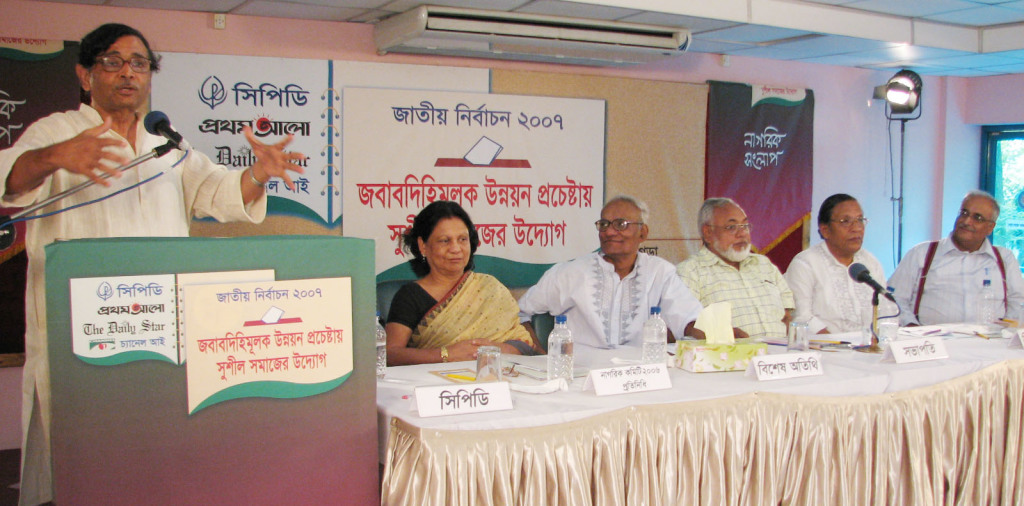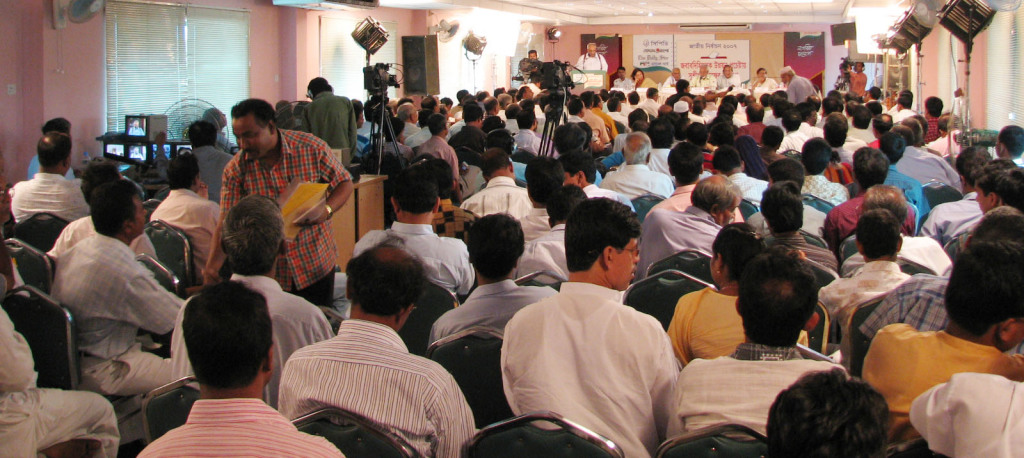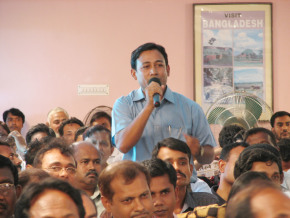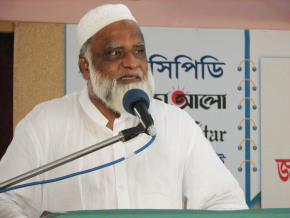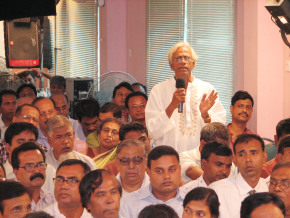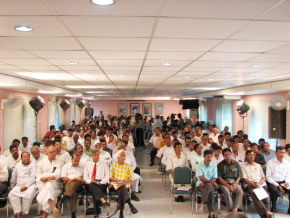Speakers at the regional dialogue in Bogra (August 26, 2006) demanded election campaign of candidates from all the parties from a single stage and their election expenditure at the expense of the government to avoid the influence of black money.
Emphasising reaching the dialogue up to grass rootslevel, they demanded reforms in the election system, separation of judiciary and Election Commission from the executive body and stoppage of religion-based politics.
The honest citizens are also forced to be corrupt, as the corruption has been institutionalised in the society, the speakers said, adding that the Election Commission and local administration should remain out of political influence.
Centre for Policy Dialogue (CPD) organised the dialogue as part of a civil society initiative with the collaboration of The Daily Star, Prothom Alo and the Channel i. Executive Director of CPD Debapriya Bhattacharya conducted the dialogue on campaign for honest and competent candidates in the election in 2007, and accountable development.
Educationist Shyamol Bhattacharya and retired teacher of Bogra Polytechnic Institution Bazlul Karim Bahar were the special guests at the dialogue chaired by Dr Moshiur Rahman.
Mahfuz Anam, editor of The Daily Star, addressed the dialogue on behalf of the organisers.
Prof Abdullah Abu Sayeed and Prof Mahmuda Islam, members of Nagorik Committee 2006, formed for preparing a vision paper for Bangladesh in 2021, also spoke.
A large number of local elite including political leaders, development workers, lawyers, teachers, cultural activists, social workers, journalists and students participated in the dialogue that continued for about seven hours at Bogra Parjatan Motel auditorium in the town.
After independence, corruption grabbed the society due to lack of patriotism among the people, Shyamol Bhattacharya said, adding that people cast vote for the symbol instead of observing the candidate.
The government changed the true spirit of the constitution through various amendments, he said.
The members of the civil society keep smooth the journey of people, said Bazlul Karim Bahar. A peculiar darkness that has grasped the country is to be removed, he said.
In his presidential address, Dr Moshiur Rahman, a prominent social worker in the area, suggested formation of a citizens’ commission for ensuring accountability and monitoring government activities.
Emphasising the need for concrete suggestions instead of abstracts ideas, he said the citizens are the actual owner of the country but it is not felt before a general election comes near.
Prof Abdullah Abu Sayeed said after the fall of autocratic military rule a democratic autocracy imposed on the country as all power centred on the prime minister.
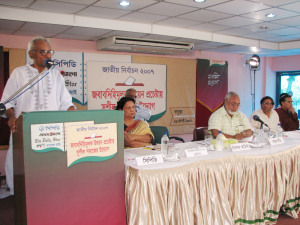 For the first time after independence, general people are openly speaking out against corruption and misrule, he said.
For the first time after independence, general people are openly speaking out against corruption and misrule, he said.
Demanding separation of judiciary from the executive, Prof Sayeed said the whole nation will support the civil society movement for pushing the state towards a justice-based administration.
He expressed optimism about the future of the Bangalee nation that has achieved independence ‘for the first time in its history’.
Prof Mahmuda Islam of Dhaka University said a black money holder can never be a competent candidate.
She urged the people for creating pressure on the government for bringing equality between man and woman.
She also urged the political parties to nominate more women candidates in the next general election. She demanded direct election in the seats reserved for women.
The main objective of the dialogue is to create a platform to express opinion of the citizens other than those on the political stage, Mahfuz Anam said, adding that the citizens should have the right to express political opinion without any hindrance.
He expressed the hope that the politicians would see the recommendations of the civil society with respect and try to accept those.
Political parties should have organised such regional dialogues but none of them took the initiative, he said.
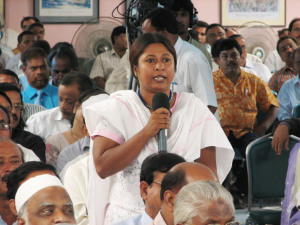 President of Bogra district Awami League (AL) Alhaj Momtaz Uddin categorically told the dialogue that his party would not participate in the next general elections unless its demands for electoral reforms are met.
President of Bogra district Awami League (AL) Alhaj Momtaz Uddin categorically told the dialogue that his party would not participate in the next general elections unless its demands for electoral reforms are met.
He alleged, “Politics have been corrupted by people who came from the cantonment.”
The AL leader also criticised the government for having Ershad, the once autocrat, acquitted of corruption charges.
He claimed Ziaur Rahman himself never claimed he proclaimed the independence of the country. But those who oppose the independence created a debate on the proclamation of independence in their own interest, Momtaz added.
Rezaul Karim Tansen, president of Bogra district Jatiya Samjtantrik Dal (JSD), demanded prohibition of politics based on religion. “No reforms no elections,” he said adding that bringing reforms in the electoral system is necessary to avoid conflict.
The country never faced a crisis like this after its independence, observed advocate Fazlul Bari, president of Bogra district Gono Forum. People are also doubtful whether the next general elections would be held at all, Bari said.
AL General Secretary of Bogra Mujibur Rahman Mojnu said people should not vote for those who keep themselves isolated from the people. He said some sort of benefit would come if awareness were created among the people through this kind of dialogue.
President of Bogra Lawyers Association Mir Iqbal Hossain blamed black money for destroying social values. He proposed that the account of income and expenditure of all close relatives of an election candidate should be published before the election.
He said there should be a judicial mechanism to control the rise of black money. According to him, the elections would not be free or fair when black money is present.
Executive Director of Thangamara Mohila Sabuj Shangha (TMSS) Hosne Ara Begum opposed the criticism of Non-Government Organisations (NGO) saying the NGOs are helping people increase production and reduce the pressure on the government.
“Still people get pleasure criticising the NGO’s,” she pointed out. She claimed the people who were rejected by the government services or deprived of other financial opportunities formed most of the NGO’s.
Khandaker Golam Kader, a prominent playwright, observed that all development policies were formulated targeting only 15 percent of the population. “Rest 85 percent who live in the villages remain deprived,” he added.
He urged the policymakers to take initiative and do something for the vast majority of the population.
President of Bogra Chamber of Commerce and Industry Alhaj Fazlur Rahman Paiker urged people to stop hartals in the country. He said because of hartals foreigners do not want to invest in our country. He also criticised the tendency of people to become a legislator without having any grassroots-level experience in politics. “Those who want to become MPs should do politics at local level for at least two years,” he said.
Former MP Quamrunnahar Putul said no election could be held in a free and fair manner under Chief Election Commissioner MA Aziz.
Mahmuda Hakim said the major political parties should hold dialogues to resolve the serious political crisis existing in the country. She said dialogue is the only way to reach a consensus and get rid of the deadlock.
NGO worker Mir Abdur Razzaq observed that political criminals were controlling politics in Bangladesh.
Advocate Shakil Ahmed, chairman Holy Family Foundation, Abul Kalam Azad, principal of Taslim Uddin Tarafdar College, Aminul Haque, ward commissioner of Bogra, Aminul Farid, Abdul Hannan of JANIPOP, Abul Kawsar, Rafiqul Islam, ABM Ziaul Haque Babla, Darin Pervez, Ismail Hossain Makob, advocate Shakhawat Hossain, Mahfuz Siddique Liton, Samir Roy, Enamul Haque Ranju, Towfique Hasan Moina, Sadiqur Rahman Sujan, Abdur Razzaq Raju, Liakat Ali, Belal Uddin Ahmed, Pintu Areng, Abu Taher Shamim, Azizar Rahman Taj, Altaf Hossain, Ahmedul Haque, Helal Uddin, Rafiqul Haque Khan, Goutam Kumar Das, Rafiqul Islam Lal, Hasan Ali Sheikh, Rezaul Karim Monto, Zobaer Hasan Liton, Alok Talukder, Zahedur Rahman, Mostafa Alam Nannu, Mahmudul Haque Chowdhury, Abdur Rouf, Daizy Ahmed, Quamruzzaman Kajol, Abdur Rashid, Khaled Bin Jalal, Advocate Amjad Hossain and Mohammad Shamsul Abedin also participated in the discussion.


